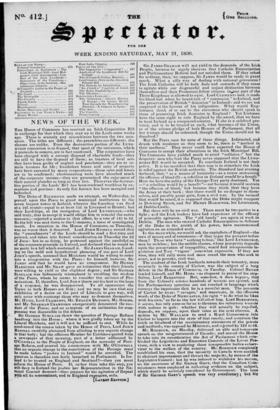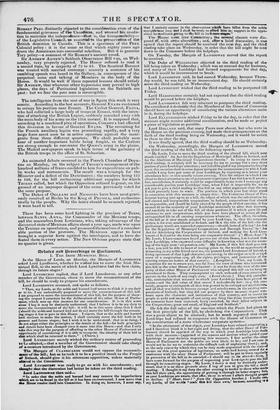NEWS OF THE WEEK.
THE House of Commons has received an Irish Corporation Bill in exchange for that which they sent up to the Lords some weeks ago. There is scarcely any resemblance between the two mea- sures. The titles are different ; the preambles are different; the clauses are unlike. Even the destructive portion of the LYND- HURST concoction is so framed, that most of the nuisances, which it pretends to remove, are in fact continued. The corporators have been charged with a corrupt disposal of charitable funds—they are still to have the disposal of them; as trustees of local acts they have been guilty of neglect and peculation—they are to re-
main trustees for ; fraudulent leases and sales of property have been executed by many corporations—those sales and leases are to be confirmed; electioneering tools have absorbed much of the corporate income—they are guaranteed the enjo, scent of their annual plunder as long as they live. Thus even the destruc- tive portion of the Lords' BPI has been rendered worthless by ex- ceptions and provisos : its only fair feature has been mangled and bedaubed.
The Duke of RICHMOND made an attempt, on Wednesday, to prevail upon the Peers to grant municipal institutions to the seven largest towns in 14-eland, wherein the franchise e as fixed at a 101, rental—equal to at least la/. in Liverpool or Bristol; but their Lordships, at the instigation of Lord LIINDHURST,—W110 said truly, that to accept it would oblige him to remodel the entire measure,—rejected a motion to that effect, by a vote of 141 to 82. So the bill was sent down to the Commons, a mass of unmitigated insult. Its reception in the House of Commons, on Thursday, was no worse than it deserved. Lord JOHN RUSSELL moved that the " amendments " of the Lords should be read a first time and printed, and taken into formal consideration on Thursday the 2d of June: but in so doing, he protested against the annihilat'on of the corporate principle in Ireland, and declared that he would be no party to a bill which contained it. Sir JAMES GRAHAM, found- ing on the mild and hypothetical phrasing of one part of Lord JOHN'S speech, assumed that Ministers would be willing to enter into a compromise with the Peers : for himself, however, Sir JAMES said that he would have no compromise. Sir HENRY HARDINGE and Mr. Sitsw gave no intimation that their friends were willing to yield in the slightest degree ; and Sir GEORGE SINCLAIR was ludicrously triumphant in extolling the wisdom of the Peers, whom he seems to consider the saviours of Pro- testantism. If, therefore, Lord JOHN threw out his hint in the hope
of a response, he was disappointed. To all appearance the Tories in both Houses are film; and we may be sure that any exhibition of a desire on the part of Liberals to give way, will
only cover with contempt those who may so demean themselves. Mr. Hums:, Lord CLEMENTS, Mr. EVELYN DENI50:41, Mr. ROCHE, and Mr. SHARMAN CRAWFORD energetically denounced the con- duct of the Peers; and no symptom of an inclination for com- promise was discernible in the debate.
Sir GEORGE Slf•ICLAIR threw the question of Peerage Reform headlong- into the House ; where it was gladly taken up by the
Liberal Members, and it will not be suffered to rest. While he 'condemned the course taken by the House of Peers, Lord JoHN RUSSELL carefully abstained from alluding to any organic change in that body; but the officious Member for Caithness quoted from a newspaper of that morning, part of a letter addressed by O'CoNNEss to the People of England, on the necessity of Peer-
age Reform, and avowed his concurrence with Mr. O'CONNELL that an organic change in the constitution of the Peerage must be made before "justice to Ireland' would be accorded. The
question is therefore now fairly launched in Parliament. Is Ire- land to be treated as England and Scotland?—t hen you must raform the House of Peers. If, rather than take this step, you
will deny to Ireland the justice her Representatives in the Na- tional Council demand—then prepare fur the agitation of Repeal Ttith all its concomitant? and te England enpeosive, evils.
[LaTis37 EDITION.] Sir JAMES GRAHAM will not yield to the demands of the Irish People, because he sagely observes that Catholic Emancipation and Parliamentary Reform had not satisfied them. If they asked for nothing, then, we suppose, Sir JAMES would be ready to grant much. What a silly way of dealing with national grievances ! The Irish Catholics will be both fools and cowards if they cease to agitate while one disgraceful and unjust distinction between themselves and their Protestant fellow citizens inuany part of the Three Kingdoms is allowed to exist. Lord CLEMENTS said, it made his blood boil when he heard talk of " concession " to Ireland, and the preservation of British " dominion" in Ireland: and we are not surprised at the fervour of his indignation. What would Eng- lishmen think of or say to the statesman who should speak to them of preserving Irish dominion in England ? Yet Irishmen have the same right to rule England by the sword, that we have to treat Ireland as a conquered country. If she is a subdued pro- vince, and is to be treated as such, what becomes of the Union, or of the solemn pledge of both Houses of Parliament, that all her wrongs should be redressed, though the Union should not be dissolved ?
But the Peers care for none of these things. Infatuated, and drunk with insolence as they seem to be, there is "method in their madness." They never could have expected the House of C0111111011S to accept their alterations in the Irish Municipal Bill. The Commons have yielded much to avoid "collision ;" but the desperate men who lead the Peers never supposed that the LYND- /I URST Bill would be accepted. To conciliate Ireland is not their policy. It is too manifest that their aim is to stimulate the Irish to rebel against the British authority. The Standard last evening declared, that, is as a means of humanity—as a cause restraining the effusion of blood (1)—a rebellion in Ireland would be a benefit." Here we have the policy of the Orange-Tory party disclosed. Yes —" a rebellion would be a benefit"—not because it would restrain "the effusion of blood," but because they think that they have the Army at their beck ; that there would be no danger to them- selves, and possibly great gain, from a civil war. In the turmoil that would be raised, it is supposed that the Duke might reappear in Downing Street, and Sir HENRY HARD' NOR, his Lieutenant, at Dublin Castle.
But there will be no civil war. There must be two parties to a fight ; and the Irish leaders have had experience of the efficacy of peaceable agitation. The "old hands" are again at work in Dublin. The men who carried Catholic Emancipation in defiance of the Duke in ti a zenith of his power, have recommenced agitation on an extended scale.
In the mean while, wewould ask the capitalists of England —the men of money and of commerce—if they enjoy the prospect before them? Those who have" nothing to lose," like Lord LvelDHURST, may be reckless; but the middle classes, whose prosperity depends upon the preservation of tranquillity, would find irresponsible le- gislation and Tory "vigour" somewhat expensive. If they are wise, they will rally more and more round the men who seek to avert, not to provoke, civil war. The conduct of the Irish landlords towards their tenantry, more especially in the county of Carlow, was the subject of a long debate in the House of Corneae-is, en Tuesday. Colonel Bauer( lauded himself, and Mr. HOPE 0 as eloquent in praise of his step- father, Lord BERESFORD. But, somehow, it does happen, that from the Colonel's estates hundreds of tenants are ejected, and his Parliamentary speeches are not couched in language which conveys the impression that he is a merciful man. The peasants of Carlow he terms " savages," and maintains, in the 'offensive words of the Duke of NEWCASTLE, his right " to do what he likes with his own," as far as the law will allow him. Lord BERESFORD, it seems, has only gone so far as to threaten his refractory tenants
with notices to quit: whether they will actually be expelled, depends, we suppose, upon their votes at the next electron. A
motion by Mr. WALLACE to send a Royal Commission into
Carlow to inquire into the state of that county, and ascertain the truth or falsehood of the recriminatory statements of the priests
and landlords, was opposed by Ministers, and rejected by 123 to 52. Mr. ROEBUCK, on Monday, delivered an able and temperate speech on the misgovernment of Canada; and moved the House_ to take into its consideration the Act of Parliament which este- , bushed the Legislative and Executive Councils of the Lauer Pro. vince, with a view to rendering those irresponsible bodies subser- vient to the welfare of the country. Mr. ROEBUCK completely
established his case, that the miuority in Canala were enabled to obstruct improvement awl thwart the major itv, by means of the
Legislative Council : but he was induced to withdraw his motion,
on the assurance of Sir GEORE GREY, that the Canadian Com- missioners were employed in collecting evidence on the subject, which would be seriously considered by Government. The tone of Sir GEORGE GREy's speech was very eoaciliatpry Sip ROBERT PEEL distinctly objected to the consideration even of the fundamental grievance of the Canadians, and avowed his resolu- tion to maintain the independence—that is, the irrespoasibility- of the Legislative Coosteil, as essential 'to the presernstina of the British dominion in Canada. This is a specimen of the PEEL Colonial policy : it is the same as that which eighty years ago drove the Americans into successful rebellion. But it is genuine Tory policy—a remnant of Sir ROBERTS ancient creed.
Sir ANDREW Antsaw's Sabbath Observance Bill w as, on Wed- nesday, very properly rejected. The House refused to read it a second time, by a majority of 75 to 43. The fanatical Baronet was treated with merited contempt : scarcely a sentence of his rambling speech was heard in the Gallery, in consequence of the perpetual noise and talking of Members in the body of the House. It would be well if these repeated lessons should satisfy Sir ANDREW, that whatever other hypocrisies may prevail in high places, the days of Puritanical legislation on the Sabbath are past : but we fear the poor man is incorrigible.



























